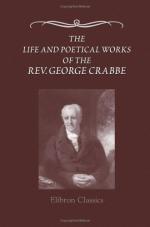|
This section contains 6,572 words (approx. 22 pages at 300 words per page) |

|
SOURCE: Prince, Hugh C. “George Crabbe's Suffolk Scenes.” In Humanistic Geography and Literature, edited by Douglas C. D. Pocock, pp. 190-208. London: Croom Helm, Ltd., 1981.
In the following essay, Prince analyzes Crabbe's poetry in order to evaluate his relationship with his native Suffolk.
In a history of English literature, George Crabbe (1754-1832) stands apart from his contemporaries.1 He was an Augustan poet who rhymed couplets in the manner of Pope, Gray and Dyer, but his verses destroyed the pastoral idyll and depicted village life, ‘as Truth will paint it, and as Bards will not’.2 He rejected Thomson's progressive view of the seasonal round and Goldsmith's nostalgic vision of the deserted village. The countryside which Crabbe knew most intimately was not an Elysium where swains and shepherdesses idly disported themselves, but a stretch of ‘burning sand’ where men and women struggled ceaselessly to wrest a meagre subsistence from the...
|
This section contains 6,572 words (approx. 22 pages at 300 words per page) |

|


